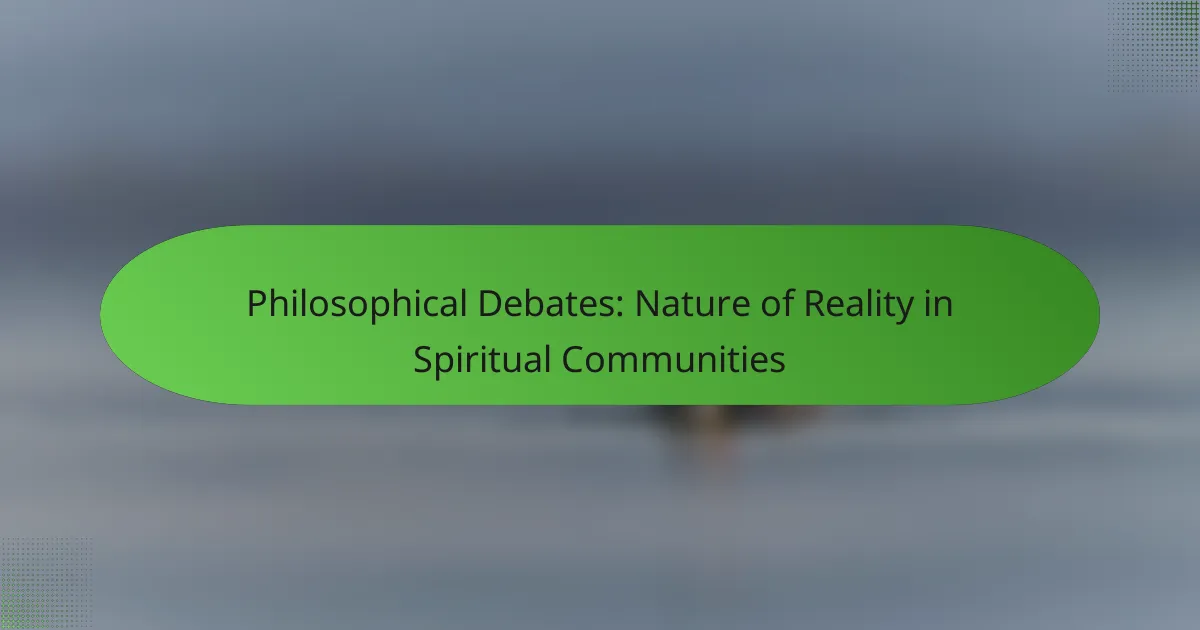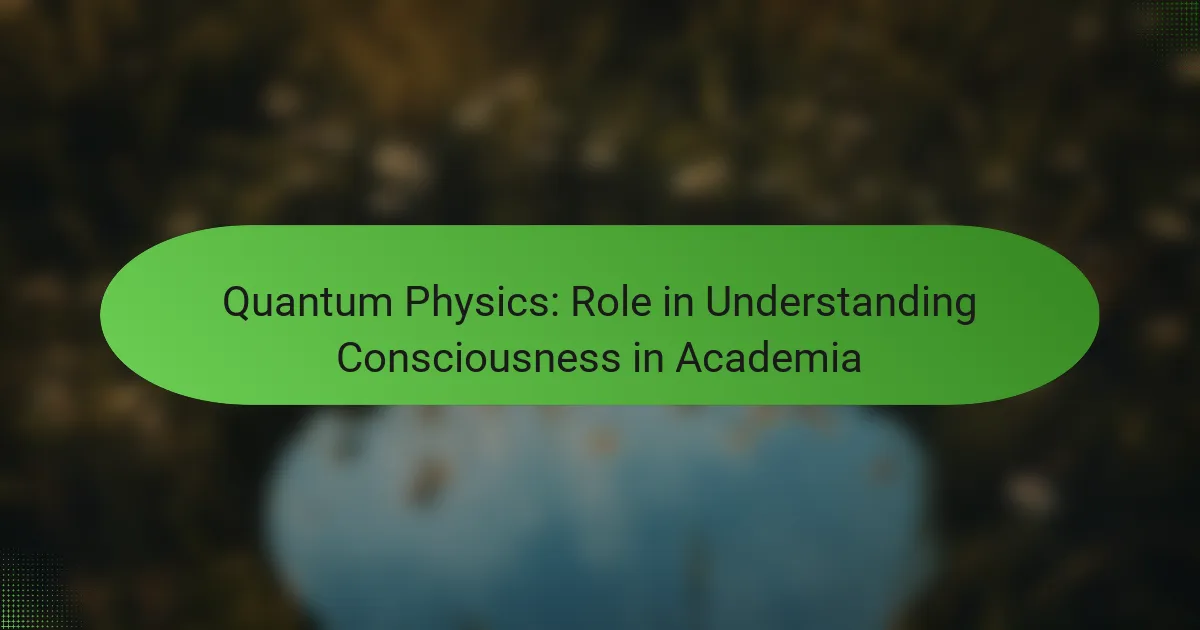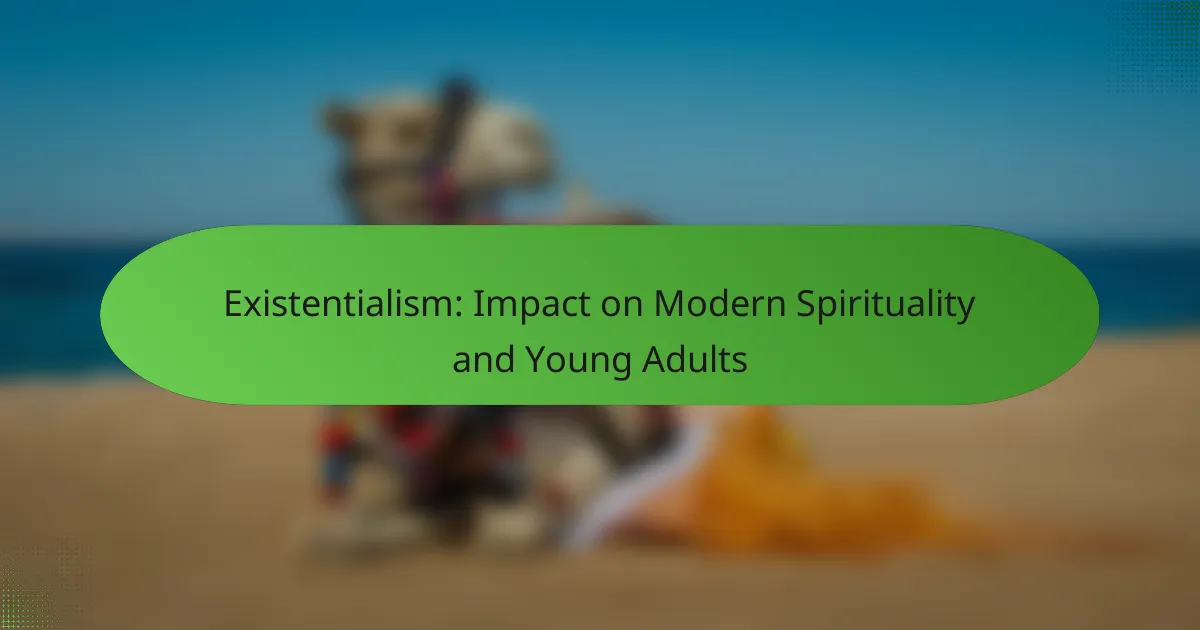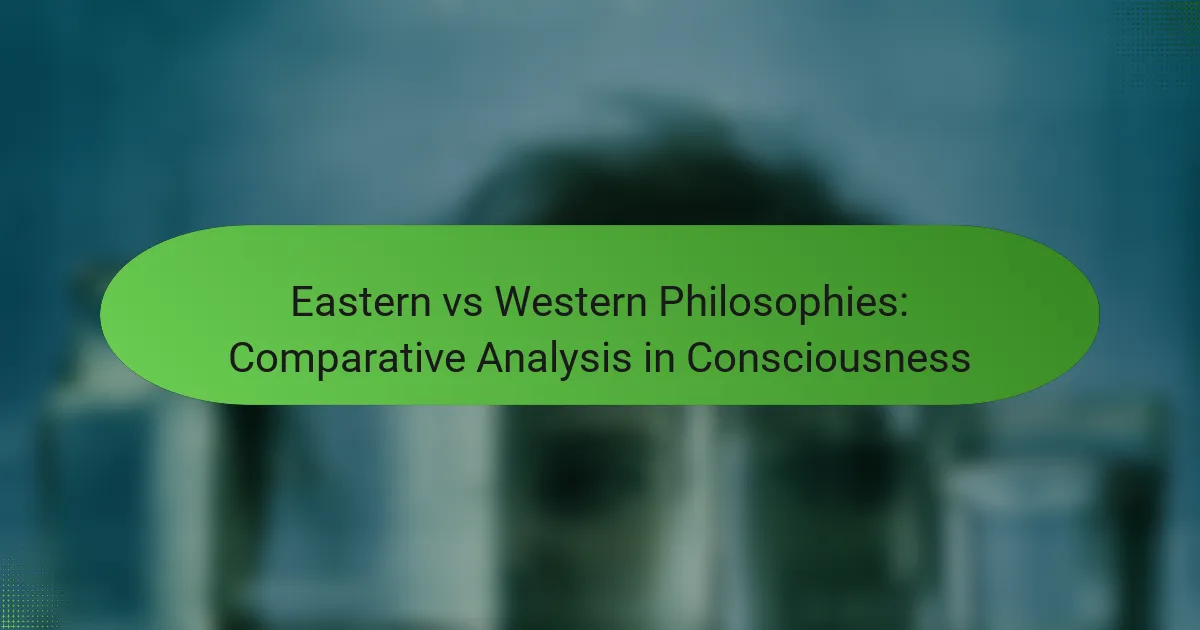Philosophical debates regarding the nature of reality within spiritual communities focus on the intricate relationship between existence, consciousness, and the material versus spiritual realms. These discussions not only shape individual beliefs and practices but also foster a deeper understanding of interconnectedness and the multifaceted nature of reality beyond the physical world.
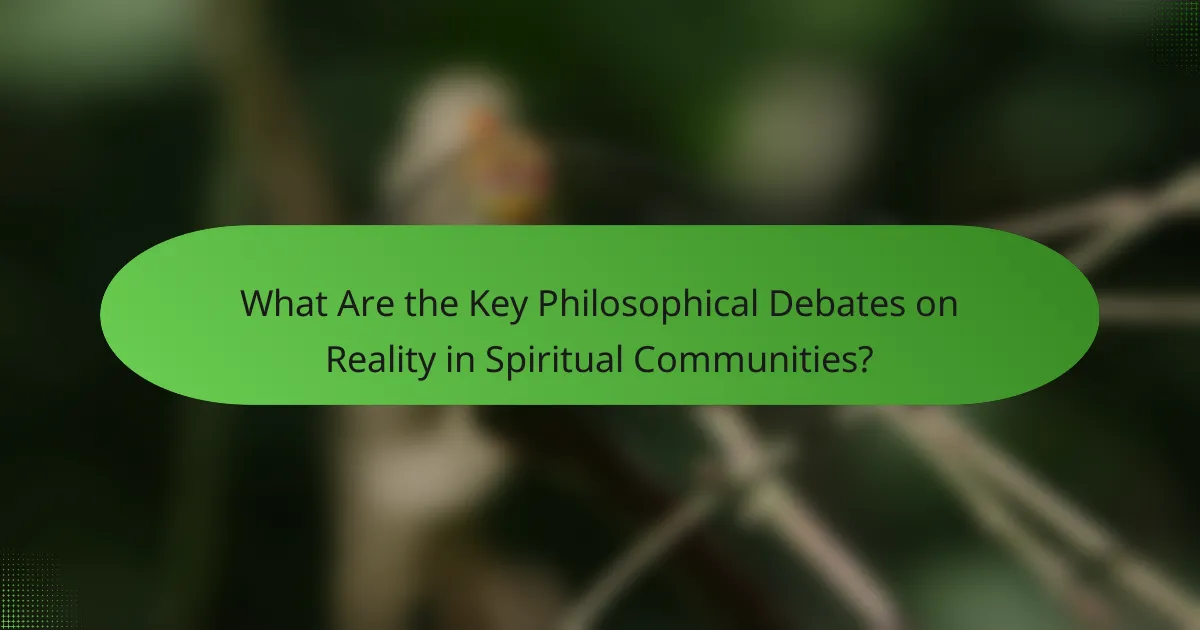
What Are the Key Philosophical Debates on Reality in Spiritual Communities?
Key philosophical debates on reality within spiritual communities often revolve around the nature of existence, consciousness, and the interplay between the material and spiritual realms. These discussions shape beliefs and practices, influencing how individuals perceive their experiences and the world around them.
Materialism vs. Idealism
Materialism asserts that only physical matter exists, while idealism posits that reality is fundamentally mental or spiritual. In spiritual communities, this debate often manifests in discussions about the nature of consciousness and whether it can exist independently of the body.
For example, materialists may argue that spiritual experiences are merely brain functions, while idealists might contend that these experiences reveal deeper truths about existence. Understanding these perspectives can help individuals navigate their beliefs and experiences more effectively.
Dualism vs. Monism
Dualism maintains that reality consists of two distinct entities: the physical and the spiritual, whereas monism argues for a unified reality where everything is interconnected. In spiritual contexts, dualism often leads to a focus on the separation of body and soul, while monism encourages a holistic view of existence.
Practitioners may find that embracing monism fosters a sense of unity and interconnectedness, which can enhance their spiritual practices. Conversely, dualistic views might lead to a more fragmented understanding of self and reality.
Existentialism and Meaning
Existentialism explores the search for meaning in a seemingly indifferent universe, often emphasizing personal responsibility and authenticity. In spiritual communities, this philosophy encourages individuals to create their own meaning through experiences and choices.
Engaging with existential questions can lead to profound insights about one’s purpose and values. Spiritual practices that promote self-reflection, such as meditation or journaling, can help individuals navigate these existential dilemmas.
Phenomenology of Spiritual Experience
Phenomenology focuses on the subjective experience of individuals, emphasizing how spiritual experiences are perceived and interpreted. This approach is crucial in spiritual communities, as it acknowledges the diversity of experiences and the personal significance they hold.
Individuals are encouraged to articulate their experiences without imposing external frameworks, allowing for a richer understanding of spirituality. This can lead to greater empathy and connection among community members as they share their unique journeys.
Postmodern Perspectives
Postmodernism challenges the idea of absolute truths, suggesting that reality is constructed through language, culture, and social contexts. In spiritual communities, this perspective can lead to a more pluralistic approach to beliefs and practices, recognizing the validity of multiple viewpoints.
Embracing postmodern thought encourages individuals to question established norms and explore diverse spiritual traditions. This openness can foster a more inclusive environment where varied beliefs coexist and enrich the community’s collective understanding of reality.
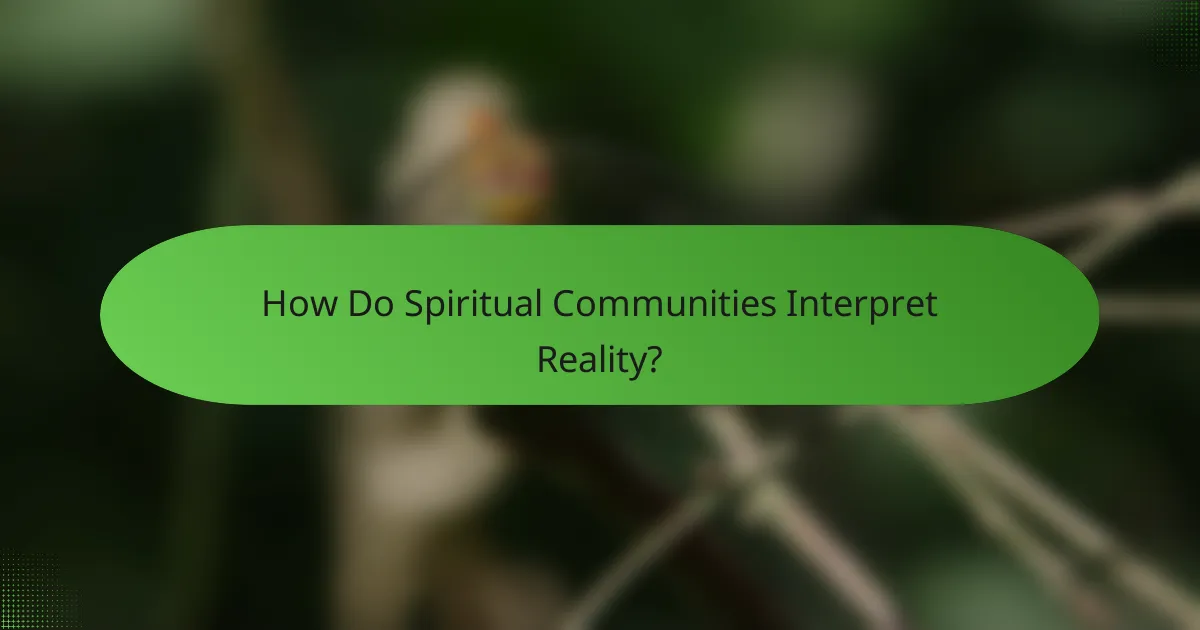
How Do Spiritual Communities Interpret Reality?
Spiritual communities often interpret reality as a multifaceted experience that transcends the physical world, emphasizing a deeper understanding of existence. This perspective integrates beliefs about the nature of consciousness, the universe, and the interconnectedness of all beings.
Holistic Worldview
A holistic worldview in spiritual communities sees reality as an interconnected whole rather than a collection of separate parts. This perspective encourages individuals to consider how their actions and thoughts impact the greater universe, promoting a sense of responsibility towards oneself and others.
Practices like meditation, mindfulness, and holistic healing are often employed to cultivate this awareness. By engaging in these practices, individuals can develop a deeper connection to their inner selves and the world around them.
Collective Consciousness
Collective consciousness refers to the shared beliefs, ideas, and moral attitudes that shape a community’s reality. Spiritual communities often believe that this collective awareness influences individual experiences and societal norms, creating a unified field of energy and thought.
Engagement in group activities, such as prayer or communal rituals, can enhance this sense of collective consciousness. These practices foster a feeling of belonging and shared purpose, reinforcing the belief that individual realities are interwoven with the larger community.
Interconnectedness of All Beings
The interconnectedness of all beings is a fundamental concept in many spiritual traditions, asserting that all life forms are linked through a shared existence. This belief encourages compassion and empathy, as individuals recognize their connection to others and the environment.
Practices such as compassion meditation or environmental stewardship are common in spiritual communities, promoting actions that reflect this interconnectedness. By understanding that one’s well-being is tied to the well-being of others, individuals can cultivate a more harmonious and supportive reality.
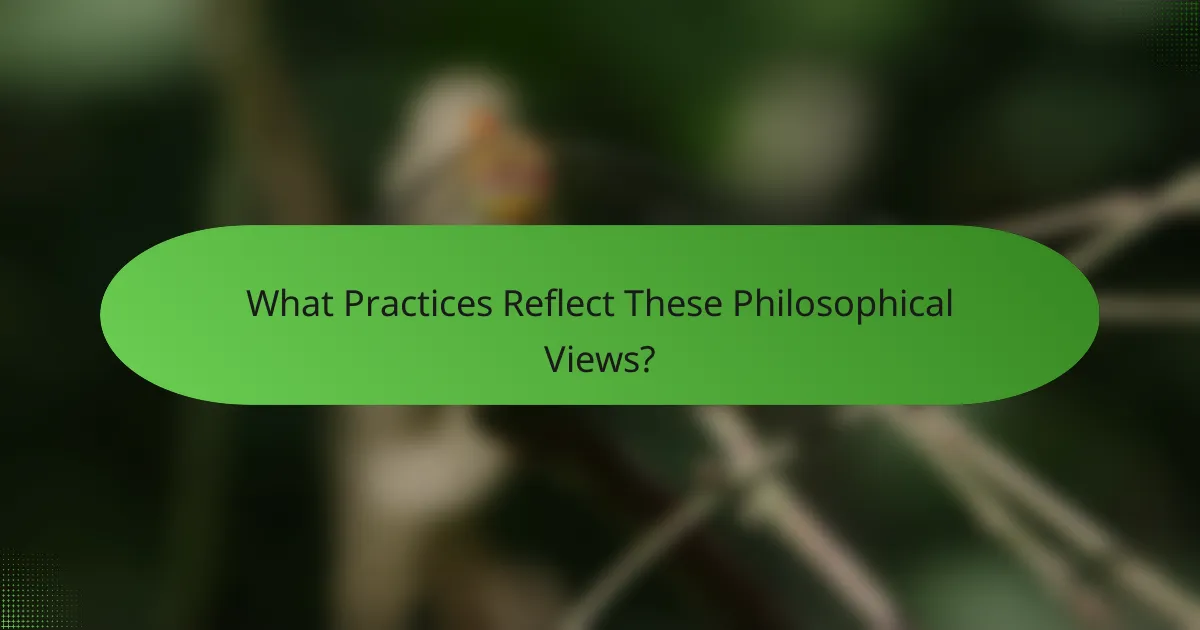
What Practices Reflect These Philosophical Views?
Spiritual communities often express their philosophical views through specific practices that embody their understanding of reality. These practices include meditation techniques, rituals, and community discussions, each serving to deepen the connection to their beliefs and enhance personal and collective experiences.
Meditation Techniques
Meditation techniques vary widely among spiritual communities, yet they share a common goal of fostering inner peace and self-awareness. Practices such as mindfulness meditation, transcendental meditation, and guided visualization are popular, often emphasizing breath control and focused attention.
For example, mindfulness meditation encourages practitioners to observe their thoughts without judgment, while transcendental meditation typically involves the repetition of a mantra. These techniques can range from a few minutes to several hours, depending on individual preference and community guidelines.
Rituals and Ceremonies
Rituals and ceremonies serve as tangible expressions of spiritual beliefs, often marking significant life events or seasonal changes. Common examples include rites of passage, seasonal festivals, and communal prayers, which help reinforce community bonds and shared values.
These rituals may involve specific actions, such as lighting candles, chanting, or offering food, and can vary in duration from brief ceremonies lasting minutes to elaborate events spanning several days. Engaging in these practices can enhance a sense of belonging and connection to the larger spiritual framework.
Community Discussions and Debates
Community discussions and debates provide a platform for members to explore and challenge philosophical views regarding the nature of reality. These gatherings often encourage open dialogue, allowing participants to share insights, ask questions, and engage in critical thinking.
Such discussions can take place in various formats, including informal gatherings, structured workshops, or online forums. They often focus on topics like the meaning of existence, the role of consciousness, and the intersection of spirituality and science, fostering a deeper understanding of diverse perspectives within the community.
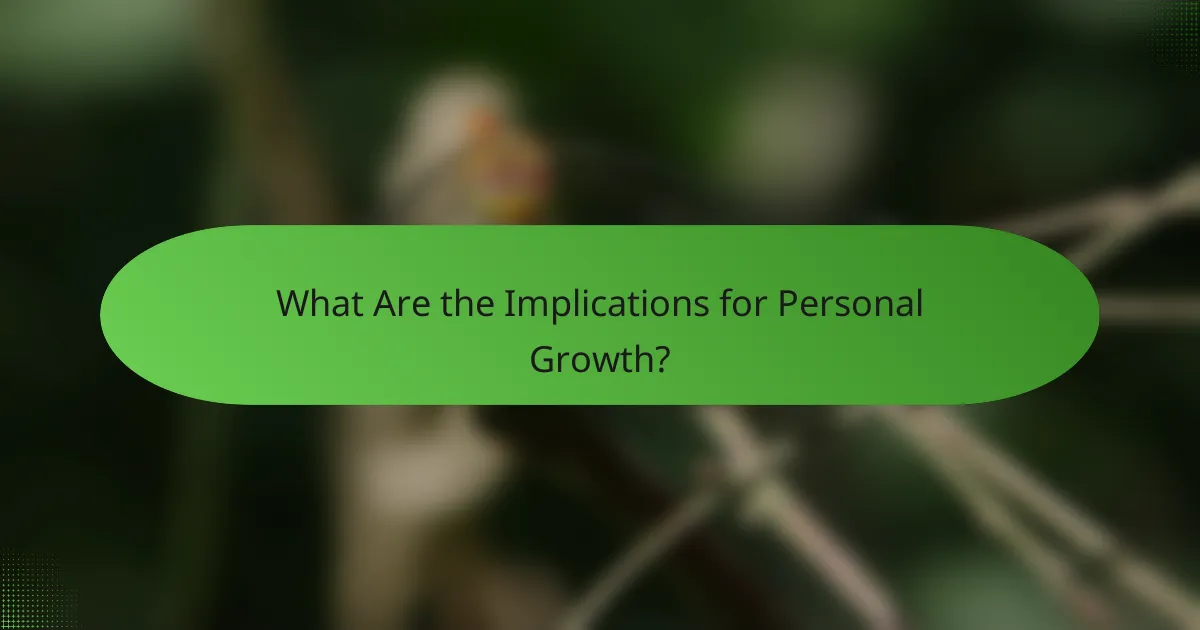
What Are the Implications for Personal Growth?
The implications for personal growth within spiritual communities often center around enhanced self-awareness and ethical living. Engaging in philosophical debates about the nature of reality can lead individuals to explore their beliefs, values, and responsibilities, fostering a deeper understanding of themselves and their place in the world.
Self-Discovery Through Spiritual Inquiry
Spiritual inquiry encourages individuals to question their assumptions about reality, leading to profound self-discovery. By reflecting on personal experiences and beliefs, one can identify patterns that shape their worldview. This process often involves practices like meditation, journaling, or group discussions, which can help clarify thoughts and feelings.
Engaging with diverse philosophical perspectives within spiritual communities can also broaden one’s understanding of existence. For instance, exploring concepts such as mindfulness or interconnectedness can shift how individuals perceive their relationships with others and the environment.
Ethical Living and Responsibility
Philosophical debates in spiritual contexts often emphasize the importance of ethical living and personal responsibility. As individuals gain insights into their beliefs, they may feel compelled to align their actions with their values, promoting a more harmonious existence. This alignment can manifest in various ways, such as adopting sustainable practices or engaging in community service.
Moreover, ethical living can be guided by principles derived from spiritual teachings, such as compassion and integrity. Individuals are encouraged to consider the impact of their choices on others and the planet, fostering a sense of accountability that enhances personal growth and community well-being.
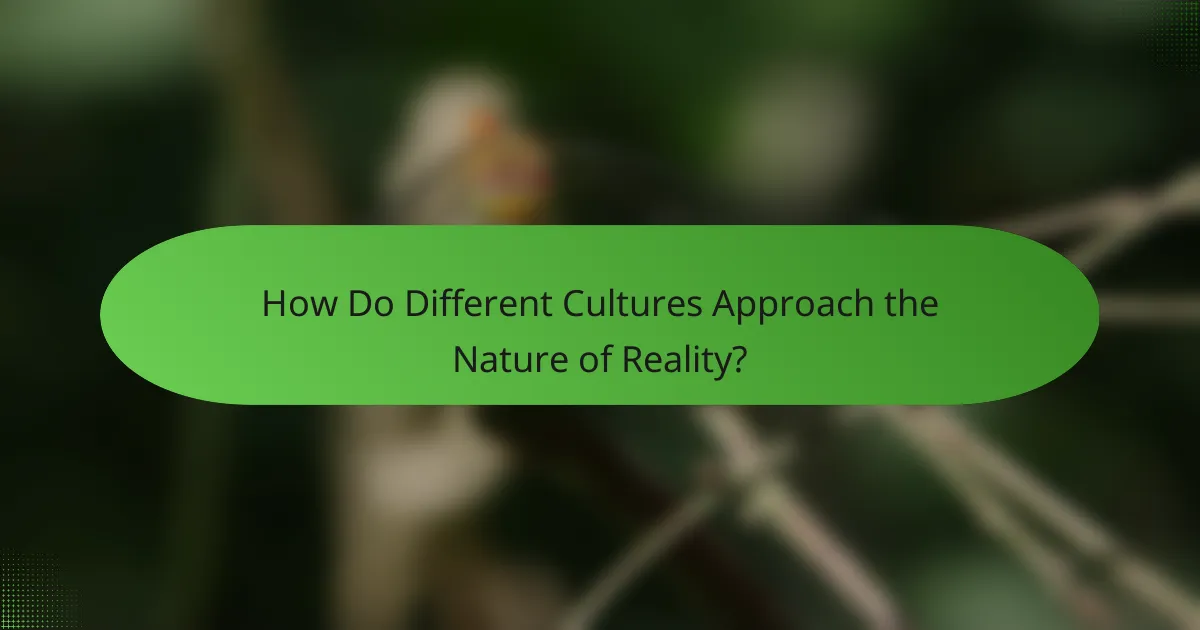
How Do Different Cultures Approach the Nature of Reality?
Different cultures have unique perspectives on the nature of reality, often shaped by their spiritual beliefs and practices. These approaches can influence how individuals perceive existence, consciousness, and the universe.
Eastern Philosophies
Eastern philosophies, particularly those rooted in Hinduism, Buddhism, and Taoism, often view reality as interconnected and fluid. Concepts like Maya in Hinduism suggest that the material world is an illusion, while Buddhism emphasizes the impermanence of all things. This perspective encourages individuals to seek enlightenment and transcend the physical realm.
Practices such as meditation and mindfulness are common in these traditions, aiming to help individuals experience a deeper understanding of reality. For instance, Zen Buddhism promotes direct experience over intellectual understanding, guiding practitioners to perceive reality as it is, without the filters of personal bias.
Western Spiritual Movements
Western spiritual movements, including New Age philosophies and various religious traditions, often emphasize a more dualistic view of reality. Many believe in a distinction between the physical and spiritual realms, suggesting that reality consists of both material existence and a higher spiritual dimension. This duality can lead to a focus on personal empowerment and self-discovery.
Practices such as visualization, affirmations, and energy healing are prevalent, aimed at aligning individuals with their spiritual truths. For example, many New Age practitioners believe that thoughts can shape reality, encouraging a proactive approach to manifesting desired outcomes.
Indigenous Beliefs and Practices
Indigenous beliefs often center on a deep connection to the land and nature, viewing reality as a living tapestry of relationships among all beings. Many indigenous cultures hold that the spirit world is as real as the physical world, and they engage in rituals and ceremonies to honor this interconnectedness.
For instance, many Native American traditions involve storytelling and rituals that reinforce the relationship between people, nature, and the cosmos. These practices serve to maintain harmony and balance, reflecting a holistic understanding of reality that integrates the spiritual and physical realms.
